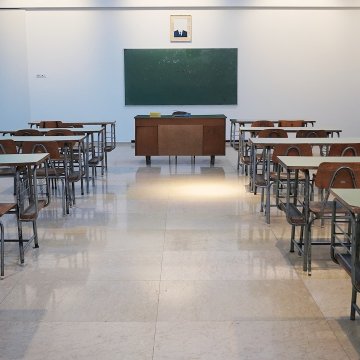- About
- Topics
- Picks
- Audio
- Story
- In-Depth
- Opinion
- News
- Donate
- Signup for our newsletterOur Editors' Best Picks.Send
Read, Debate: Engage.
| topic: | Economic Fairness |
|---|---|
| located: | Poland |
| editor: | Katarzyna Rybarczyk |
Although teachers play a crucial role in empowering young people and helping them realise their potential, their low wages in Poland raise concerns about the country’s ability to offer inclusive and equitable high-quality education.
At the beginning of 2023, the national minimum wage in Poland increased from PLN3010 (€642) per month to PLN3490 (€743) per month. Nevertheless, the salaries of teachers in the three lowest pay grades fall between PLN3329 and PLN3425, meaning that instructors at the beginning of their careers now earn less than the minimum wage. Sławomir Broniarz, head of the Polish Teachers’ Union (ZNP) said that this state of affairs is “an illustration of how the government, the education ministry, treats teachers.”
The cost-of-living in Poland, like in much of Europe, has been on the rise in recent months and economists expect inflation to surpass 20 percent in February 2023. With teachers’ pay not rising accordingly, those whose profession was once amongst the most prestigious will struggle to have a decent quality of life.
Perhaps even more importantly, low wages are the main reason many teachers are leaving the profession, according to a survey conducted by “Głos Nauczycielski,” the largest nationwide socio-educational newspaper. Teachers are quitting their jobs en masse and few candidates are postulating to replace them, leaving public schools in Poland with a shortage of educational professionals. Estimates by teachers’ unions show a shortage of around 20,000 teachers and, according to the Office of the Ombudsman, the situation will get more dire in the near future.
As schools are unable to find suitable candidates to fill available positions, some teachers are being asked to teach subjects that fall outside their area of expertise. Regrettably, in a situation where, for instance, a Polish language teacher instructs a maths class, the quality of teaching is compromised.
Besides, when teachers do not feel valued, they become demotivated and their effectiveness decreases even more. The Centre for Public Opinion Research (CBOS) asked parents whose children study in public schools about their thoughts on the standard of education; less than half of respondents described it as “good.”
An increasing number of teachers who previously worked for public schools are turning to private establishments. There, teachers’ higher remuneration translates to higher productivity, increased motivation and improved morale. Consequently, the gap between the quality of education offered by public and private schools is constantly growing. And as fees for private schools are unaffordable for the majority of the population, this divide risks discriminating against those from low-income households.
To ensure that good quality education is treated as a basic right, not a privilege, the issue must be addressed immediately. Fortunately, the government has already announced pay raises for teachers that will enter into effect once the state budget is approved by the Senate. “The average teacher’s pay will increase by 7.8 per cent in relation to wages that came to force in September 2022,” said Adrianna Całus-Polak, spokeswoman for the Ministry of Education and Science. She also added that, until that happens, teachers who earn below the minimum wage can receive supplementary pay.
These planned increases are promising but, looking ahead, more attention must be given to preserving the respect of the teaching profession and further improving their working conditions. After all, without teachers, who will inspire children’s dreams and equip them with skills necessary to achieve them?
Photo by Ivan Aleksic

